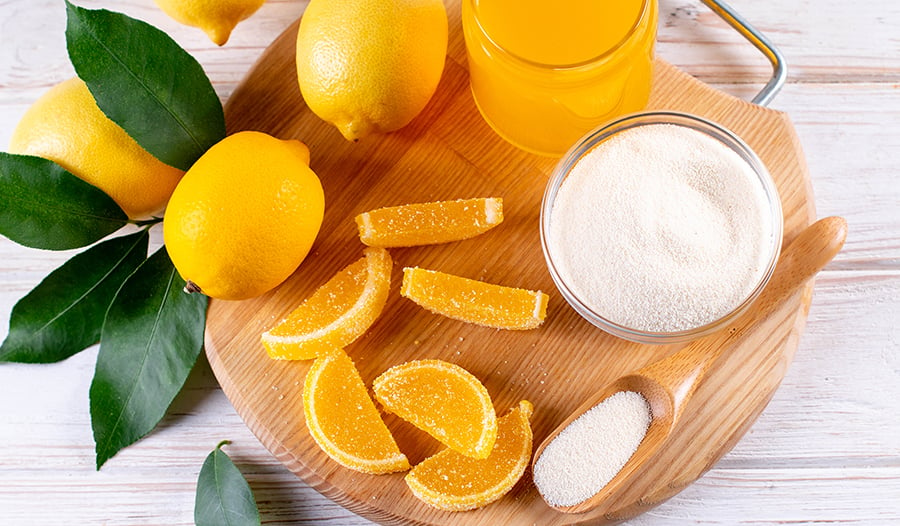Четыре полезных свойства пектина

Что такое пектин?
Пектин — растворимая пищевая клетчатка, содержащаяся почти во всех растениях, у которых она входит в состав клеточных стенок. Особо высокая концентрация пектина наблюдается в кожуре и коре фруктов и овощей — он обеспечивает их высокую прочность. Например, кожура апельсина содержит 30% пектина, яблочная шкурка — 15%, а шелуха лука — 12%. Пектин также встречается в мякоти фруктов и овощей.
С химической точки зрения пектин представляет собой сложный полисахарид, состоящий из ряда простых сахаров и сахарных кислот. Его гелеобразующие свойства известны каждому, кто готовил желе или варенье. Именно они обуславливают некоторые из полезных эффектов пектина, особенно касающиеся здоровья кишечника, регулирования уровня сахара в крови и метаболизма холестерина.1
Есть ли разные виды пектина?
В продаже есть две основные разновидности пектина: яблочный и модифицированный цитрусовый пектин (МЦП). Их получают из мякоти соответствующих фруктов.
Яблочный пектин
Яблочный пектин проходит минимальную обработку и имеет более выраженные гелеобразующие свойства.
Модифицированный цитрусовый пектин
Модифицированный цитрусовый пектин (МЦП), или фракционированный пектин, обрабатывают для получения более коротких цепочек полисахаридов, которые быстрее растворяются в воде и лучше усваиваются организмом, чем обычный длинноцепочечный яблочный пектин.
Уникальные полезные свойства МЦП обусловлены способностью его быстро усваиваемых соединений связываться с лектинами в нездоровых клетках — галактинах. Такое связывание не дает этим клеткам соединиться, попасть в кровоток и другие ткани организма.15
МЦП имеет и некоторые другие полезные свойства, связанные с его быстро усваиваемыми компонентами. В первую очередь, он заметно усиливает активацию лейкоцитов: цитотоксических Т-клеток и естественных клеток-киллеров, а также поддерживает работу иммунитета.15
Полезные свойства пектина
Холестерин и регулирование артериального давления
Пектин продемонстрировал способность усиливать метаболизм холестерина и поддерживать нормальное артериальное давление. Так, яблочный пектин может поддерживать здоровье сердца за счет улучшения метаболизма холестерина.
В печени холестерин является основным источником для образования желчных кислот. Яблочный пектин улучшает уровень холестерина в крови за счет связывания с желчными кислотами в тонком кишечнике. С уменьшением концентрации желчных кислот в стуле на их синтез уходит больше холестерина, что способствует снижению его уровня в крови.2
Подробный анализ 67 исследований с участием 2990 взрослых людей показал, что пектин снижает уровень холестерина низкой плотности («плохого» холестерина), не изменяя при этом уровень холестерина высокой плотности («хорошего» холестерина). В целом, при приеме в качестве пищевой клетчатки яблочный пектин (5 г в день) может снизить общий уровень холестерина на 5–16%.3 Модифицированный цитрусовый пектин оказывает куда менее выраженное действие за счет более слабых гелеобразующих свойств.4
Именно снижение уровня холестерина может обуславливать способность яблочного пектина улучшать состояние кровеносных сосудов и поддерживать нормальное артериальное давление.5
Управление весом и регулирование уровня сахара в крови
Яблочный пектин замедляет опорожнение желудка. Это может усиливать чувство сытости. Иными словами, яблочный пектин помогает вам быстрее почувствовать себя сытыми и съесть меньше еды, что способствует похудению.6
Проводилось исследование с участием 74 мужчин и женщин, служащих в вооруженных силах США и имеющих нормальный вес. Они не ели на ночь, а утром выпивали 448 мл апельсинового сока с пектином или без. Было отмечено, что 5 г пектина способствуют более быстрому чувству насыщения.7 Эффект проявлялся в течение четырех часов после употребления пектина с апельсиновым соком.
Замедленное опорожнение желудка также связывают с улучшением регулирования уровня сахара в крови после приема пищи, что также положительно сказывается на сдерживании аппетита. Пектин продемонстрировал некоторую эффективность в снижении уровня глюкозы в крови после приема пищи у людей с плохим регулированием уровня сахара8, но у людей с хорошим регулированием уровня сахара эффект был незначительным.9
Здоровье кишечника
Наконец, наиболее значительное полезное свойство пектина — улучшение микрофлоры кишечника — генетического материала микроорганизмов, обитающих в нашем кишечнике.10
Живущие в кишечнике микроорганизмы (бактерии, вирусы и грибы) крайне важны для здоровья в целом. Яблочный пектин способен действовать как пребиотик, поддерживая в кишечнике рост и активность полезных бактерий, одновременно подавляя рост вредных (например, Clostridium м Bacteroides sp.)10,11
За счет этого яблочный пектин может быть потенциально полезен при дисбактериозе — изменении состава кишечной микрофлоры, связанным с газообразованием, вздутиями и зловонным стулом.
Помимо пользы для микрофлоры, яблочный пектин поддерживает здоровую перистальтику кишечника (за счет своих гелеобразующих качеств). Благодаря своей способности связывать воду яблочный пектин делает стул более мягким и однородным, и стул лучше проходит по кишечнику.
Улучшение вывода тяжелых металлов
Благодаря своим гелеобразующим качествам и способности связывать желчные кислоты пектин помогает при детоксикации организма.
Как и любая гелеобразующая клетчатка, пектин помогает вывести из организма такие тяжелые металлы, как свинец, ртуть, кадмий и т. д. Для данных целей может лучше подходить МЦП, так как его использовали в четырех клинических исследованиях детоксикации от тяжелых металлов.
Добавки с МЦП усилили вывод свинца, мышьяка и кадмия с мочой у здоровых добровольцев и не продемонстрировали побочных эффектов или падения уровня незаменимых питательных веществ.12
Небольшое исследование с участием пяти пациентов показало уменьшение уровня свинца или ртути в среднем на 74% без побочных эффектов при применении только МЦП или МЦП в сочетании с альгинатом.13 Прием МЦП также значительно уменьшил уровень свинца в моче у детей, госпитализированных с отравлением свинцом.13
Рекомендации по дозировке
Стандартная рекомендуемая дозировка пектина составляет пять граммов в день.
Побочные эффекты и меры предосторожности
Пектин исключительно безопасен и не имеет серьезных побочных эффектов при приеме в рекомендуемой дозировке. При употреблении любого вида клетчатки важно пить много воды. Любые рецептурные лекарства не следует принимать вместе с пектином, чтобы избежать влияния пищевой клетчатки на эффект.
Источники:
- Moslemi M. Reviewing the recent advances in application of pectin for technical and health promotion purposes: From laboratory to market. Carbohydr Polym. 2021 Feb 15;254:117324..
- Gunness P, Gidley MJ. Mechanisms underlying the cholesterol-lowering properties of soluble dietary fibre polysaccharides. Food Funct. 2010 Nov;1(2):149-55.
- Brown L, Rosner B, Willett WW, Sacks FM. Cholesterol-lowering effects of dietary fiber: a meta-analysis. Am J Clin Nutr. 1999 Jan;69(1):30-42.
- Brouns F, Theuwissen E, Adam A, et al. Cholesterol-lowering properties of different pectin types in mildly hyper-cholesterolemic men and women. Eur J Clin Nutr. 2012 May;66(5):591-9.
- Khan K, Jovanovski E, Ho HVT, Marques ACR, Zurbau A, Mejia SB, Sievenpiper JL, Vuksan V. The effect of viscous soluble fiber on blood pressure: A systematic review and meta-analysis of randomized controlled trials. Nutr Metab Cardiovasc Dis. 2018 Jan;28(1):3-13.
- Di Lorenzo C, Williams CM, Hajnal F, Valenzuela JE. Pectin delays gastric emptying and increases satiety in obese subjects. Gastroenterology. 1988 Nov;95(5):1211-5.
- Tiwary CM, Ward JA, Jackson BA. Effect of pectin on satiety in healthy US Army adults. J Am Coll Nutr. 1997 Oct;16(5):423-8.
- Schwartz SE, Levine RA, Weinstock RS, Petokas S, Mills CA, Thomas FD. Sustained pectin ingestion: effect on gastric emptying and glucose tolerance in non-insulin-dependent diabetic patients. Am J Clin Nutr. 1988 Dec;48(6):1413-7.
- Sanaka M, Yamamoto T, Anjiki H, Nagasawa K, Kuyama Y. Effects of agar and pectin on gastric emptying and post-prandial glycaemic profiles in healthy human volunteers. Clin Exp Pharmacol Physiol. 2007 Nov;34(11):1151-5.
- Koutsos A, Tuohy KM, Lovegrove JA. Apples and cardiovascular health--is the gut microbiota a core consideration? Nutrients. 2015 May 26;7(6):3959-98.
- Olano-Martin E, Gibson GR, Rastell RA. Comparison of the in vitro bifidogenic properties of pectins and pectic-oligosaccharides. J Appl Microbiol. 2002;93(3):505-11.
- Eliaz I, Hotchkiss AT, Fishman ML, Rode D. The effect of modified citrus pectin on urinary excretion of toxic elements. Phytother. Res. 2006;20:859–864.
- Eliaz I, Weil E, Wilk B. Integrative medicine and the role of modified citrus pectin/alginates in heavy metal chelation and detoxification-five case reports. Komplementmed. 2007;14:358–364.
- Zhao ZY, Liang L, Fan X, et al. The role of modified citrus pectin as an effective chelator of lead in children hospitalized with toxic lead levels. Altern. Health Med. 2008;14:34–38.
- Eliaz I, Raz A. Pleiotropic Effects of Modified Citrus Pectin. Nutrients. 2019 Nov 1;11(11):2619.
- Merheb R, Abdel-Massih RM, Karam MC. Immunomodulatory effect of natural and modified Citrus pectin on cytokine levels in the spleen of BALB/c mice. Int. J. Biol. Macromol. 2019;121:1–5.
ОТКАЗ ОТ ОТВЕТСТВЕННОСТИ:Информация, содержащаяся в Центре здоровья, не предназначена для постановки диагноза...
















































































 Содержание
Содержание
















